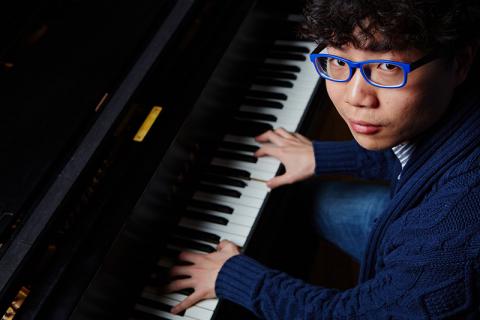Wei's Way: Beyond the Conservatory

Wei Yang
Photo by Kelly Davidson
[ 中文阅读该报导 | Read this article in Mandarin ]
After studying at Juilliard and Beijing’s Central Conservatory of Music, two of the most respected music conservatories in the world, composer and pianist Wei Yang was still searching for a music education that best matched his inventive inclinations as a developing musician. He found what he was looking for at Berklee.
Asked about the most important lesson he learned at Berklee, Wei (pronounced “way”), who is from Xiamen, China, responds, “Just one?” He laughs and smiles, then says, “Berklee is very different from a conservatory or a classical school where everyone is so competitive. You just focus on yourself and how to improve yourself. At Berklee, it’s more like you’re working with a lot of different people, you’re learning from them, and your mind starts opening and becomes more accepting to different ways of doing things. In a conservatory, you’re taught, ‘This is the right thing to do and this is wrong.’”
Right and wrong may apply when discussing traditions of classical or Chinese music, but Wei’s style, which incorporates both of these influences and also blends in some underlying jazz rhythms, eschews easy categorization.
Where Tradition Meets Experimentation
Wei graduated from Berklee last year, and these days, you might spot him somewhere around Boston with a copy of Mingyue Liang’s Music of the Billion: An Introduction to Chinese Musical Culture in hand. For a student who began playing the piano at the age of 4, Wei admits that it is ironic that he is now studying traditional Chinese music in a master’s degree program in composition on the Medford, Massachusetts campus of Tufts University. Perhaps, if Wei’s aim were solely to master the ancient music of his home country, the move would not make sense. But Wei is interested in composing his own unique music, and his education in traditional Chinese music, classical music, and jazz positions him to draw on these diverse forms to do just that.
“You experience all different kinds of music at Berklee, which you don’t experience at a conservatory, so that’s a big thing,” Wei says. “A second thing is that the student body at Berklee is much, much more international than at a conservatory. I learned a lot from people from all over the world doing all kinds of different music, whereas at a conservatory, you will still see a lot of international students, but they’re all doing classical music, so you don’t learn as much from them.”
Wei, who also holds a degree in information management from Beijing’s University of International Business and Economics, says, “Before I met (Berklee professor) Joanne Brackeen, my music was almost all classical. Now, almost every piece of my music sounds like some subtle combination of Chinese music and Western music.”
In addition to Brackeen, Wei expresses his gratitude for Berklee faculty members such as Alla Elana Cohen and the late John Bavicchi. After finishing the master’s degree program, he plans to pursue a doctorate in order to advance his career as a composer, performer, and music educator. In the latter role, one can easily imagine Wei encouraging students interested in broadening their musical horizons to follow their experimental instincts.
Finding a Lifelong Music Community
Before he left China, Wei posted a message online using Baidu, which is comparable to Google in the U.S. It said, “I’m going to Berklee. Is anyone coming with me?” He included his contact information, and ever since, he has fielded questions from potential Berklee students in China. “I ask them to be clear about what they want to do, and if Berklee is what they want to do, I say that they need to be prepared,” Wei says. “By ‘prepared,’ I mean that you should jump out of the conservatory box of thinking and start getting to know different kinds of music and cultures.”
As a former peer advisor to international students at Berklee, Wei knows all about preparing for the challenges that students face when studying abroad, from relying on Skype to connect with family to longing for food that tastes like home. Fortunately, Wei says, Berklee is effective in providing international students with a network to help them find their way in a new country. “Berklee really cares about the international community, and I feel like I got a lot of support,” he says.
Even after graduation, Wei remains in close communication with members of Berklee’s faculty, and his ongoing involvement as a volunteer ambassador exemplifies the strong ties that bind Berklee’s international community together. Wei recently traveled to several cities in China with Berklee’s vice president of enrollment, Mark Campbell, as the college discussed partnering with Chinese conservatories.
“I’m very happy to see that the community of Chinese students at Berklee is growing at such high speed,” says Wei. “Partnerships with Berklee will contribute to an understanding of Chinese music outside of China. For Berklee, as a global music institution, you cannot miss out on 20 percent of the world’s population, so it’s definitely beneficial for both sides.”
The Berklee experience has also been beneficial for Wei as he opens up new windows of musical possibility. “It’s very powerful to communicate with music,” he says. “It’s probably the best way for me to express myself.”
